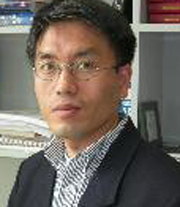Posted on : May.4,2006 07:33 KST
Modified on : May.14,2006 18:37 KST
 |
|
Prof. Jong-Kyeong Chung
|
A team of Korean scientists yesterday reported that they have identified the two genes responsible for Parkinson’s disease, providing a catalyst to conquer the brain disorder soon. Parkinson’s disease causes a movement disorder due to the failure of dopaminergic neurons. Nearly 1 percent of the population older than 50 suffers the degenerative disease.
Jong-Kyeong Chung, Professor of Biological Sciences, Korea Advanced Institute of Science and Technology, who headed the team, said that a pair of proteins, dubbed Parkin and PINK1, cause dopamine shortage by destroying mitochondria in motor cells and dopaminergic neurons.
The death of dopamine-generating cells gives rise to Parkinson’s disease, which is characterized by muscle rigidity, tremor, a slowing of physical movement (bradykinesia), and in extreme cases, a loss of physical movement (akinesia).
Parkinson's disease was first found in 1817 by the British physician James Parkinson. The associated biochemical changes in the brain of patients surrounding Parkin and PINK1 have been identified since that time by many scientists, but the innermost working mechanism involving mitochondria remained unknown until this time.
The findings that mitochondrial failure is mainly responsible for inherited Parkinson’s disease were conducted through experiments using fruit flies (Drosophila) whose Parkin and PINK1 genes were removed. Chung’s team implemented similar tests with the human genes in question and obtained outcome identical to the Drosophila model.
“Our findings mark an important breakthrough to developing a revolutionary anti-Parkinson’s drug in the near future,” Chung said, adding that he will be able to report more positive, practical results within this year.
Conducted under the auspices of the Korean government, the research will be listed as a major feature today in the online edition of the famed science magazine “Nature.” Also, the top neuroscience journal “Neuron” is scheduled to feature a similar story.
Lee, Keun Young, kylee@hani.co.kr






